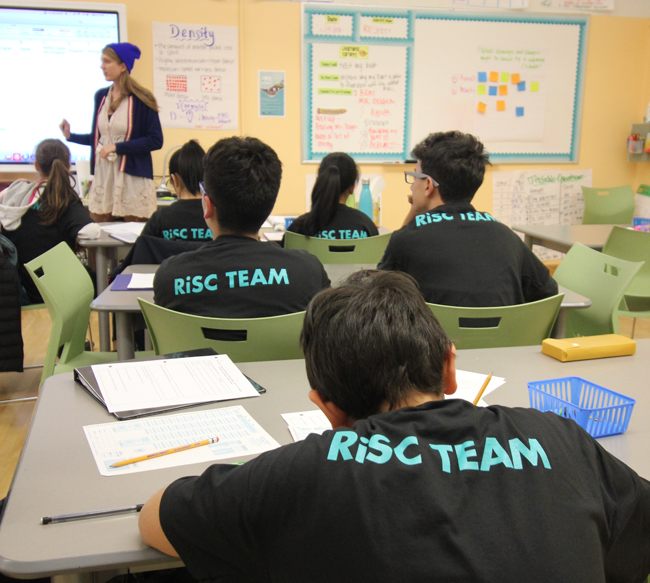
Funded through a 2016 NOAA grant, the Resilient Schools Consortium (RiSC) project's partners provide K-12 environmental literacy and climate resiliency plans for New York City’s schools (including south Brooklyn's IS228 David Boody School) that help students, faculty and districts prepare for a warming world. Credit: Heather Sioux, RiSC Program Coordinator
Contacts:
Nordica Holochuck, NYSG’s Hudson Estuary Specialist, E: nch8@cornell.edu, P: (845) 340-3983
Helen Cheng, NYSG’s Coastal Resilience Specialist at the Jamaica Bay Science and Resilience Institute, E: helen.cheng@cornell.edu, P: (718) 951-5415
New York, NY, February 26, 2018 – In late October 2012, Hurricane Sandy disrupted New York City (NYC) schools. Two hundred school buildings sustained damages, forcing the relocation of tens of thousands of students, 1.1 million NYC school children were unable to attend school for a week, and 12% of teachers had homes in flood zones.
The need for resilient schools and climate-educated students is clear as the pressures of climate change on NYC schools are likely to increase. So, to help combat the effects of severe coastal weather events, New York Sea Grant (NYSG) is providing key expertise for the creation and implementation of Resilient Schools Consortium (RiSC).
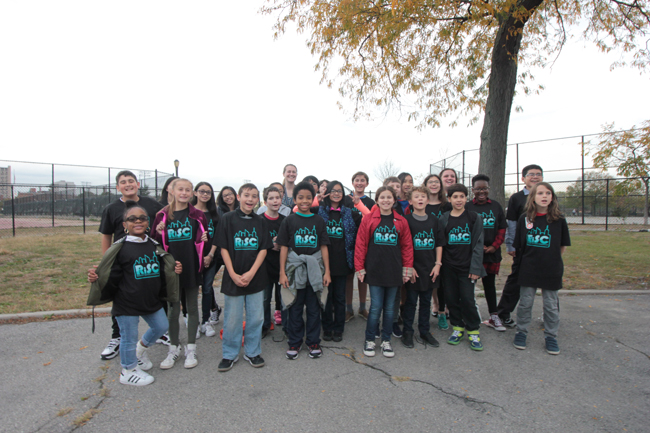
The aim of the RiSC program is to prepare NYC public school's students (like those at south Brooklyn's IS239 Mark Twain School) for participation in climate resilience planning with NYC practitioners and decision-makers. Also, these resources are proving helpful to the schools themselves, which lack the infrastructure to deal with problems like those detailed in a 2015 New York City Panel on Climate Change report: Sea level is projected to rise 11 to 21 inches by the 2050s and up to 6 feet by 2100. Increased sea level will bring coastal flooding and fiercer storm events as the oceans and atmosphere continue to warm. Credit: Heather Sioux, RiSC Program Coordinator
Awarded in Fall of 2016 and funded by a three-year $500,000 environmental literacy grant provided by the National Oceanic and Atmospheric Administration (NOAA), RiSC was created by Brooklyn College and the National Wildlife Federation (NWF) Eco-Schools USA program through a partnership with the New York City Department of Education, NYSG, and the Science and Resilience Institute at Jamaica Bay (SRIJB).
Through the RiSC program, students will be engaged in climate resiliency planning and practices. Students are asked to conduct an assessment of their school buildings, neighborhoods and communities’ vulnerability to extreme weather events. Each participating school is then offered resources to design and implement their own resiliency project such as creating a water garden to alleviate immediate effects of extreme weather events.
RiSC program has been launched in seven schools—four middle and three high schools—in South Brooklyn. Program partners engage with up to 300 students and over a dozen teachers, all of whom are from schools that were significantly impacted by Sandy.
Project teams will have an opportunity to share the first year of their work with each other during the first RiSC program summit slated for June 1, 2018.
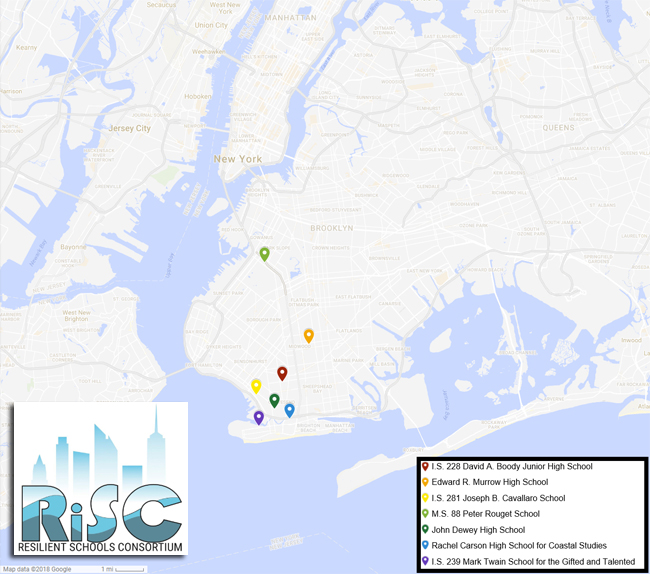
Over a half dozen school in south Brooklyn, including the ones shown here, are participating in the three-year RiSC project.
A member of the RiSC curriculum development team, NYSG’s Hudson Estuary Specialist Nordica Holochuck, shared her program’s Hudson River Valley-focused climate change lesson plans, which were adapted for this NYC-based project. The curriculum, at www.nyseagrant.org/hvclimate, helps introduce students to NOAA’s Web-based tools for analyzing and predicting the impacts of climate change and sea level rise.
“This is really a wonderful project because many of the students involved in this after-school climate literacy program have vivid memories of living through Sandy and have experienced the recovery, and community resilience in response to that extreme weather event,” said Holochuck. “The young people in this program, through planned student summits will have a chance to contribute to NYC adaptation planning efforts.”
Helen Cheng, NYSG’s Coastal Resilience Specialist at SRIJB, is planning June’s RiSC summit, a celebration of RiSC team and student efforts. Scientists, government officials, and community members are invited to attend the summit and share their experience through dialogue with resilience practitioners. Additionally, students will have the opportunity to engage with resiliency professionals and learn about career and internship opportunities in coastal resilience practice.
“Students are very aware of the cultural and social impacts of climate change,” said Cheng. “RiSC is well needed and will support the next generation of people who are ultimately going to take after us. Providing this opportunity to city public school students, many of whom experienced the effects of Hurricane Sandy, is a great way to empower those students to be stewards and take action.”
Teachers interested in using RiSC’s resources in their schools can contact NWF's Emily Fano at fanoe@nwf.org. Stay connected with the RiSC program via Facebook and Twitter.
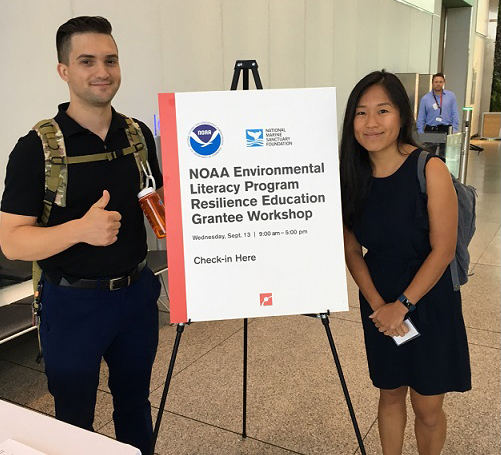
MS88 science teachers and RiSC curriculum designers Andrew Zimmermann and Lynn Shon at NOAA’s Environmental Literacy Program Grantee Workshop, held in Boston, September 2017. Photo: National Wildlife Federation
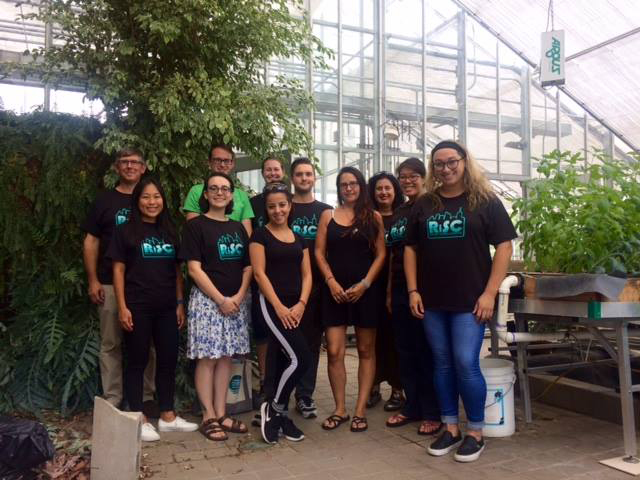
RiSC teachers and project planning team members gathered at Brooklyn College in late August 2017 for a four-day professional development workshop. Credit: Heather Sioux, RiSC Program Coordinator
More Info: New York Sea Grant
New York Sea Grant (NYSG), a cooperative program of Cornell University and the State University of New York, is one of 33 university-based programs under the National Oceanic and Atmospheric Administration’s National Sea Grant College Program.
Since 1971, NYSG has represented a statewide network of integrated research, education and extension services promoting coastal community economic vitality, environmental sustainability and citizen awareness and understanding about the State’s marine and Great Lakes resources.
Through NYSG’s efforts, the combined talents of university scientists and extension specialists help develop and transfer science-based information to many coastal user groups—businesses and industries, federal, state and local government decision-makers and agency managers, educators, the media and the interested public.
The program maintains Great Lakes offices at Cornell University, SUNY Buffalo, SUNY Oswego and the Wayne County Cooperative Extension office in Newark. In the State's marine waters, NYSG has offices at Stony Brook University in Long Island, Brooklyn College and Cornell Cooperative Extension in NYC and Kingston in the Hudson Valley.
For updates on Sea Grant activities: www.nyseagrant.org has RSS, Facebook, Twitter, and YouTube links. NYSG produces a monthly e-newsletter, "NOAA Sea Grant's Social Media Review," via its blog, www.nyseagrant.org/blog. Our program also offers a free e-list sign up via www.nyseagrant.org/coastlines for its flagship publication, NY Coastlines/Currents, which is published quarterly.